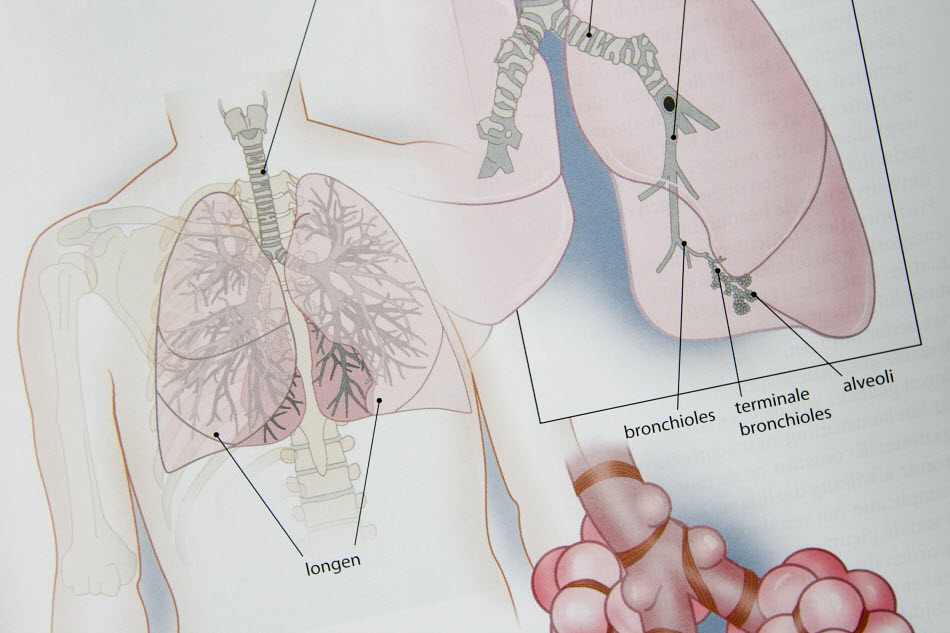Inflammatory protein also present in lungs of ex-smokers
Higher levels of the protein fstl1, a known inflammatory protein in rheumatic diseases, are also found in the lungs of COPD patients. Smoking stimulates production of this protein in the lungs, and it plays a role in inflammation and poor tissue repair in COPD. This is the conclusion of Navessa Padma Tania in her thesis on the role of fstl1 in COPD. She shows that not only COPD patients but also healthy smokers and ex-smokers have high concentrations of this protein in their lung tissue. Tania will defend her thesis at the University of Groningen on 6 October 2017. Her research was funded by lung charity Long Fonds.
'This research gives us a better understanding of the mechanism responsible for lung problems in COPD,’ explains Reinoud Gosens, Tania’s supervisor and Associate Professor at the UG. ‘This knowledge does not mean we can develop drugs immediately, but inflammatory protein fstl1 may be one of the starting points for future drugs.’
Poor tissue repair
The research fits in well with Gosens’ research on improving lung tissue repair. ‘A big problem with COPD is that the repair of lung tissue is so poor’, Gosens explains. ‘Fstl1 appears to play a role in this, because it inhibits growth factor BMP. BMP is important for tissue repair, so fstl1 prevents this repair.’
Culprit
Another problem in COPD is the constant inflammation of the lungs. Fstl1 is the culprit here too, because it provokes an inflammatory response. ‘We already knew about this effect of fstl1 from research into rheumatic diseases, but it also appears to be present in the lungs.' What is more, fstl1 plays a role in the development of blood vessels in the lungs. ‘Increased levels of fstl1 in the lungs can disrupt the effective development of blood vessels in the lungs.’ This may also contribute to the symptoms of COPD.
Irreversible effect of smoking
As fstl1 is also present in the lungs of healthy people, it is impossible to say that it causes COPD. ‘However, we do see a clear difference between the lungs of people who smoke or used to smoke and the lungs of non-smokers. Non-smokers have much lower levels of the protein. It could therefore be that the presence of the protein makes a person more susceptible to COPD, probably in combination with other factors,’ says Gosens. The research confirms what we already knew: smoking causes irreversible changes to the lungs. These effects are permanent, even if you stop smoking. ‘That is not to say that there is no point in giving up smoking. It is always much better than continuing to smoke.’
CV
Reinoud Gosens (1977) is Associate Professor in Translational Pharmacology at the Department of Molecular Pharmacology in the Faculty of Science and Engineering at the UG. He obtained his doctorate from the UG in 2004 and worked as postdoc at the University of Manitoba in Canada until 2007. His research focuses on the mechanisms of lung tissue repair in lung disease.
Note to the editor
- Navessa Tania’s thesis is entitled Developmental and Pathological Roles of BMP/Follistatin-Like 1 in the Lung. She now works at the University of Washington in the US. Her research was funded by lung charity Long Fonds.
- For more information: Professor Reinoud Gosens

| Last modified: | 14 April 2020 4.50 p.m. |
More news
-
03 April 2025
IMChip and MimeCure in top 10 of the national Academic Startup Competition
Prof. Tamalika Banerjee’s startup IMChip and Prof. Erik Frijlink and Dr. Luke van der Koog’s startup MimeCure have made it into the top 10 of the national Academic Startup Competition.
-
01 April 2025
NSC’s electoral reform plan may have unwanted consequences
The new voting system, proposed by minister Uitermark, could jeopardize the fundamental principle of proportional representation, says Davide Grossi, Professor of Collective Decision Making and Computation at the University of Groningen
-
01 April 2025
'Diversity leads to better science'
In addition to her biological research on ageing, Hannah Dugdale also studies disparities relating to diversity in science. Thanks to the latter, she is one of the two 2024 laureates of the Athena Award, an NWO prize for successful and inspiring...
